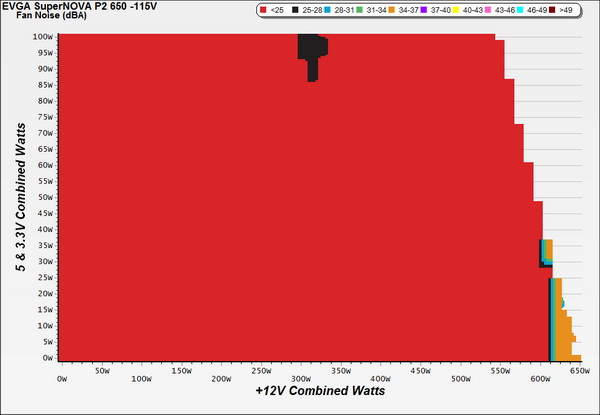EVGA SuperNOVA 650 P2 PSU Review
Why you can trust Tom's Hardware
Efficiency, Temperature And Noise
Efficiency
Our efficiency testing procedure is detailed here.
Using the results from the previous page, we plotted a chart showing the EVGA SuperNOVA 650 P2 efficiency at low loads, and loads from 10 to 110 percent of the PSU's maximum-rated capacity.
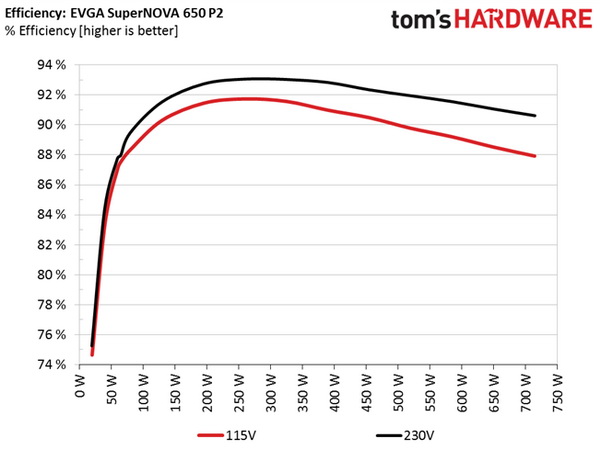
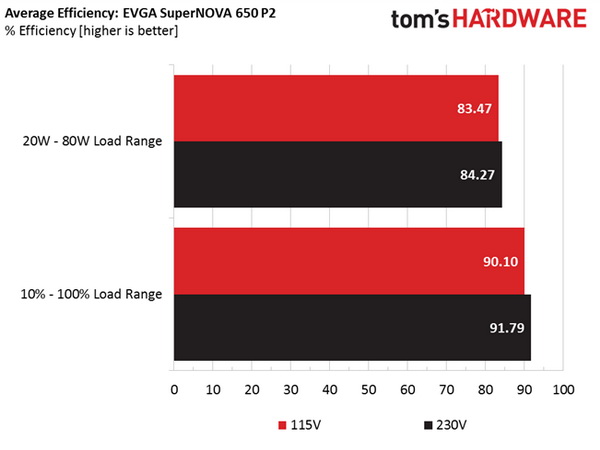
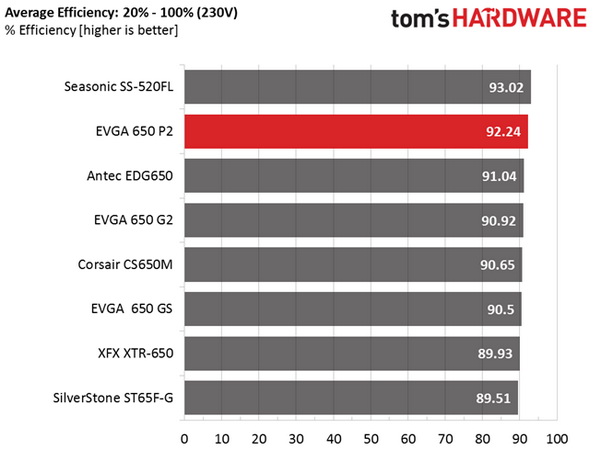
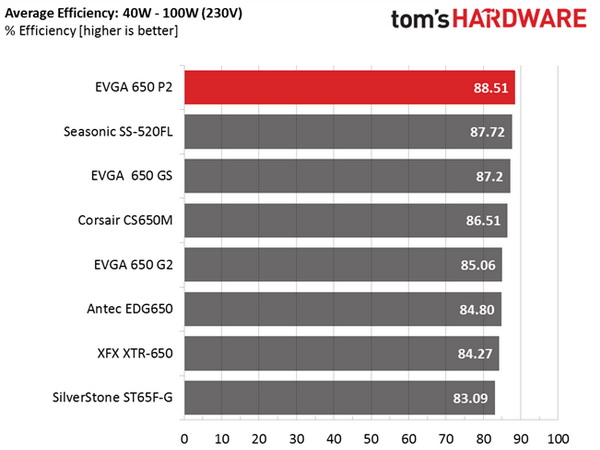
The only PSU that meets the efficiency of the 650 P2 is the Seasonic fanless unit, however at light loads the EVGA PSU manages to take the lead with a notable difference. In general, the 650 P2 is highly efficient under both light and normal loads.
Efficiency At Low Loads
In the following tests, we measure the efficiency of the EVGA SuperNOVA 650 P2 at loads significantly lower than 10 percent of the device's maximum capacity (the lowest load the 80 PLUS standard measures). The loads we dialed were 20, 40, 60 and 80W. This is important for representing when a PC is idle, with power-saving features turned on.
| Test # | 12V | 5V | 3.3V | 5VSB | DC/AC (Watts) | Efficiency | Fan Speed (RPM) | Fan Noise (dBA) | PF/AC Volts |
|---|---|---|---|---|---|---|---|---|---|
| 1 | 1.199A | 0.490A | 0.480A | 0.191A | 19.60 | 74.64% | 0 | 0 dBA | 0.820 |
| 12.138V | 5.045V | 3.316V | 5.137V | 26.26 | 115.0V | ||||
| 2 | 2.425A | 0.990A | 0.995A | 0.387A | 39.71 | 83.39% | 0 | 0 dBA | 0.903 |
| 12.138V | 5.042V | 3.315V | 5.129V | 47.62 | 115.0V | ||||
| 3 | 3.658A | 1.476A | 1.507A | 5.120A | 59.82 | 87.53% | 0 | 0 dBA | 0.954 |
| 12.137V | 5.040V | 3.313V | 5.120V | 68.34 | 115.0V | ||||
| 4 | 4.881A | 1.983A | 1.990A | 0.780A | 79.81 | 88.33% | 0 | 0 dBA | 0.954 |
| 12.138V | 5.036V | 3.312V | 5.110V | 90.35 | 115.0V |
The efficiency levels in these low load tests are jaw-dropping. In three out of the four tests, the PSU easily passed the 80 percent mark and during the last test it achieved over 88 percent efficiency. On top of that, the unit operated in passive mode and featured a very cold operation due to its minimal heat dissipation. We had to activate the thermal element inside our hot-box for quite a long time in order to apply the necessarily high ambient temperatures for our test to complete.
5VSB Efficiency
The ATX specification states that 5VSB standby supply efficiency should be as high as possible, recommending 50 percent or higher efficiency with 100mA of load, 60 percent or higher with 250mA of load and 70 percent or higher with 1A or more of load.
We will take four measurements: one each at 100, 250 and 1000mA, and one with the full load the 5VSB rail can handle.
Get Tom's Hardware's best news and in-depth reviews, straight to your inbox.
| Test # | 5VSB | DC/AC (Watts) | Efficiency | PF/AC Volts |
|---|---|---|---|---|
| 1 | 0.102A | 0.52 | 71.23% | 0.110 |
| 5.142V | 0.73 | 115.1V | ||
| 2 | 0.252A | 1.29 | 76.33% | 0.210 |
| 5.136V | 1.69 | 115.1V | ||
| 3 | 1.002A | 5.12 | 78.89% | 0.371 |
| 5.109V | 6.49 | 115.1V | ||
| 4 | 2.502A | 12.63 | 78.20% | 0.446 |
| 5.048V | 16.15 | 115.1V |
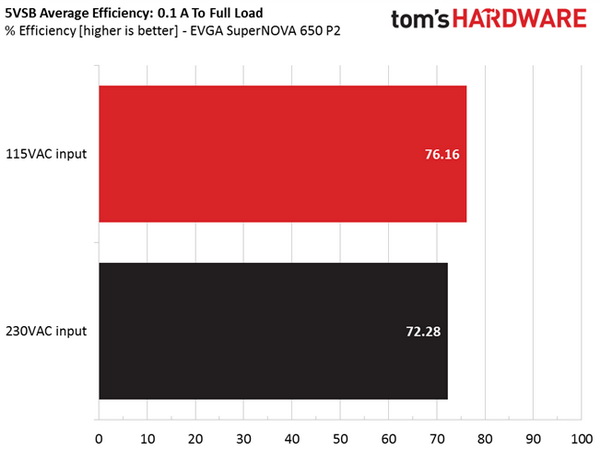
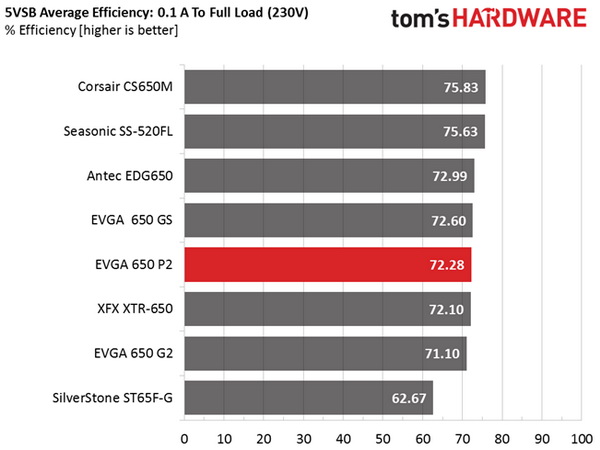
Given the overall high performance that the 650 P2 achieved, we expected a more efficient 5VSB rail. The 5VSB rail isn't bad per se, but it doesn't match the rest of the platform's performance. Super Flower should consider upgrading its 5VSB circuit in future high-end platforms, we think.
Power Consumption In Idle And Standby
| Mode | 12V | 5V | 3.3V | 5VSB | Watts | PF/AC Volts |
|---|---|---|---|---|---|---|
| Idle | 12.162V | 5.046V | 3.317V | 5.144V | 5.55 | 0.510 |
| 115.1V | ||||||
| Standby | 0.10 | 0.016 | ||||
| 115.1V |
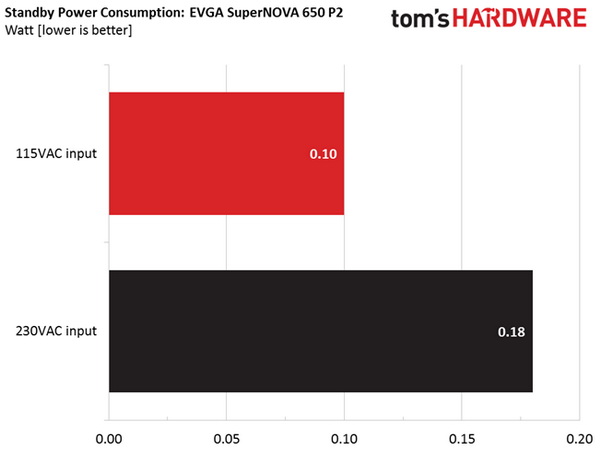
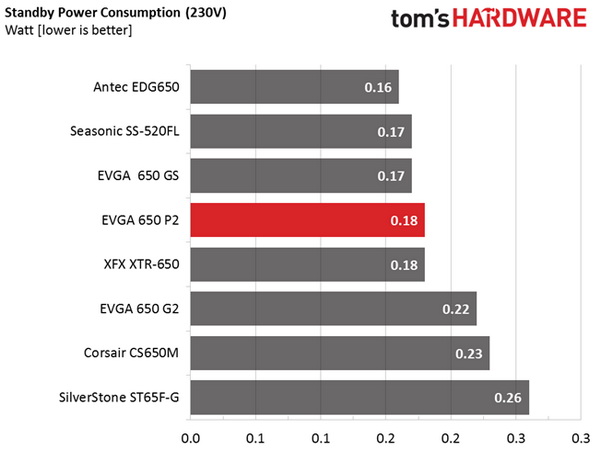
In the table above, you'll find the power consumption and voltage values of all rails (except -12V) when the PSU is idle (powered on, but without any load on its rails), and the power consumption when the PSU is in standby mode (without any load, at 5VSB).
Phantom power is quite low with both voltage inputs that we applied.
Fan RPM, Delta Temperature And Output Noise
Our mixed noise testing is described in detail here.
The first chart below illustrates the cooling fan's speed (in RPM), and the delta between input and output temperature. The results were obtained at 35 °C (95 °F) to 45 °C (114.8 °F) ambient temperature.
The next chart shows the cooling fan's speed (again, in RPM) and output noise. We measured acoustics from one meter away inside of a small, custom-made anechoic chamber with internals completely covered in sound-proofing material (be quiet! Noise Absorber kit). Background noise inside the chamber was below 18 dB(A) during testing, and the results were obtained with the PSU operating at 35 °C (95 °F) to 46 °C (114.8 °F) ambient temperature.
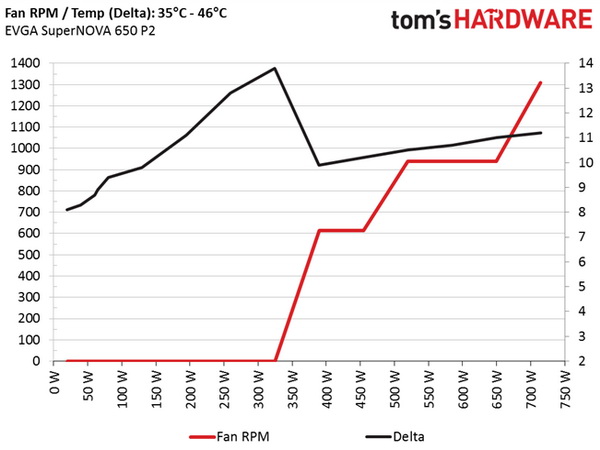
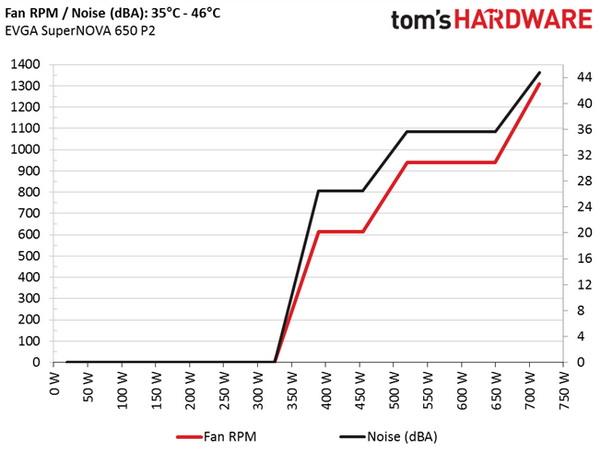
The following graph illustrates the fan's output noise over the entire operating range of the PSU. The same conditions of the above graph apply to our measurements, though the ambient temperature was between at 28 °C (82.4 °F) to 30 °C (86 °F).
As you can see from the above graph, this PSU is almost exclusively silent; its noise output is actually closer to that of a passive unit. If you want to build the quietest possible system and don't want to rely on a fanless supply, EVGA's SuperNOVA 650 P2 should be your choice.
Current page: Efficiency, Temperature And Noise
Prev Page Load Regulation, Hold-Up Time And Inrush Current Next Page Cross-Load Tests And Infrared Images
Aris Mpitziopoulos is a contributing editor at Tom's Hardware, covering PSUs.
-
cst1992 $120 is a good price for a Platinum 650W PSU. That used to be the price for Gold units with half the warranty a couple of years ago.Reply -
TbsToy Your reviews are so jaded. Anything for the ad dollars, right? Not going to go all the way here but as an example but why didn't you compare the Antec EA 650 Platinum power supply for a more fair apples to apples test instead of the Bronze 80 one? Yeah, I, know why. You guys just keep going down hill.Reply
Walt Prill
-
Aris_Mp Before you dive into conspiracy theories etc. can you tell me where you saw the bronze Antec unit? Last time I checked the Antec Edge 650 which is included in the comparison has Gold efficiency. Also I can only include PSUs which I tested with this setup and the EA 650 Platinum isn't among them. And even if it was it wouldn't do better than the EDGE 650 since it uses a budget, ACRF platform which offers average load regulation and ripple suppression.Reply
And a piece of advice, better have your facts straight before you jump into conclusions.
Merry Christmas to all! -
cst1992 @Aris_Mp I think he's talking about the EA-650 Bronze on the first page of the review. The EA-650 Platinum is also on Newegg, and it's actually cheaper than the EVGA by $6.Reply
http://www.newegg.com/Product/Product.aspx?Item=9SIA24G28N5004&cm_re=antec_ea_650-_-17-371-056-_-Product
Now that I think about it, none of the products on the first page are similar in price to this one while being Platinum, and the CoolerMaster is actually the wrong wattage. Why is that? The products should be similar in price, at least. -
Aris_Mp I have no control on the product prices shown on the first page. This is an automated script that looks on all PSUs mentioned in the review and depicts their prices. Also since I don't have so many PSU reviews with 115V input, I have to include into my comparison charts, at least in some cases, PSUs that have slightly different capacity and features than the one under test. Once I have a capable PSU database this won't be a problem any more.Reply
Also including a product in a pricing list is another thing with including it into a comparison chart. In any case I advice all of you not to lose the forest for the tree(s) and read the entire review before you draw any conclusions or make purchase decisions. Finally, in a PSU review the final rating is based on facts and numbers so the final rating is easily supported. -
Take_Out I have been in electronic/electrical power distribution field since 1964 (old fogie, used slide rules {slip sticks} to study field effect transistors, heh) working/studying/troubleshooting in a large assortment of types and uses of devices for military and industrial and residential.Reply
In gaming computer type PSU builders (not brandnames put on them), I like Super Flower, Seasonic, Antec and used to like PC Power and Cooling before the takeover, donno now. Forgot some I am sure. Use the performance list here to make PSU decisions in a fair manner.
I build gaming computers for family and friends and they kick ass for the cost and last a long time usually unless a part fails. 8800GT and 560ti video cards I liked. Now like GTX 970s and 960s for my money level. 750 and 750tis and some others nearby are only Direct X12 cards in 7 series lineup, go look it up in Wikipedia, despite deceptive advertising on Newegg that all 7 series cards are Direct X12 compatible, not like them. Must be nubies there for the holidays.
HATE changing OS just cause engineers need something to do, darn it. I know I simplify it, but it is THERE that they make you spend money and worse, learn their "NEW" way to make it work, how utterly fantastic for them. I think engineers are behind a lot of viruses so they can fix some of them, although there are bad actors for sure out there with extremists.
I think buying a well known brand (Lenovo, Dell, ASUS, etc) of regular NEW i5 4590 plain model cpu or so computer (absolutely NOT small form factor or s or t on end, ugh, regular-sized ATX board mid tower with 8 or 16GB of RAM, and a 1TB HrdDrve WD or Seagate included in price of about 500USD, then add a 240 or 500GB SSD recommended by Tom's, for OS and top games you play to load a lot faster by a wide margin, really. Steam takes up a LOT of room. Then put a good Nvidia GTX-970 or 960 into it and game away with a darn warrenty. Plus engineers have something to do with making all the parts work together, is quite a job........ really. People who make money depend on those types of puters to feed thier kids, they have to work right, not just having fun with them.
Really like Intel cpus and Nvidia 900 series video cards right now, dem magic, was a time I liked 3DFX(VooDoo2)SLI and ATI(RAGE) cards, even AMD cpus a decade or so back with the X2 64bit Athlons that buried Intel for a while.
TUROK Dinosaur Hunter is coming back, OMGosh. Game hooked me on 3D gaming for real.
EVGA seems to be broadening their approach to vending PSUs. Might prove interesting.
Usually the companies that have stayed in business for many decades are doing something right and it tells. EVGA hasn't yet, but seems to be trying hard, I like their brand of video cards and they support them well.
seriously something wrong with me, I could keep going and going, sorry....
Merry Christmas. -
f-14 too expensive a good PSU should cost $10 per 100w on average nd at the cheapest be the price of the amps on the +12v rail so in this PSU's case average price $65 and sale priced at $54.Reply
-
TomaszC I have a question regarding Fan RPM, Delta Temperature And Output Noise for load range 300W-400W - does the fan RPM changes smootchly in temperature/load function, or just switch from 0RPM to 800RPM?Reply
